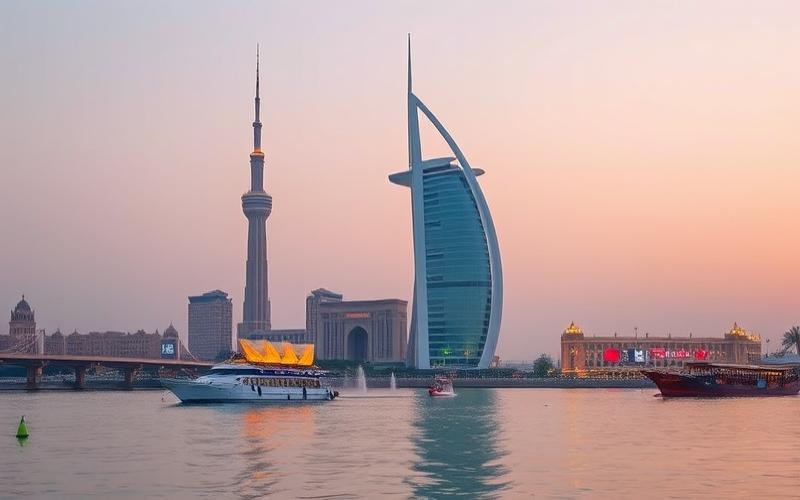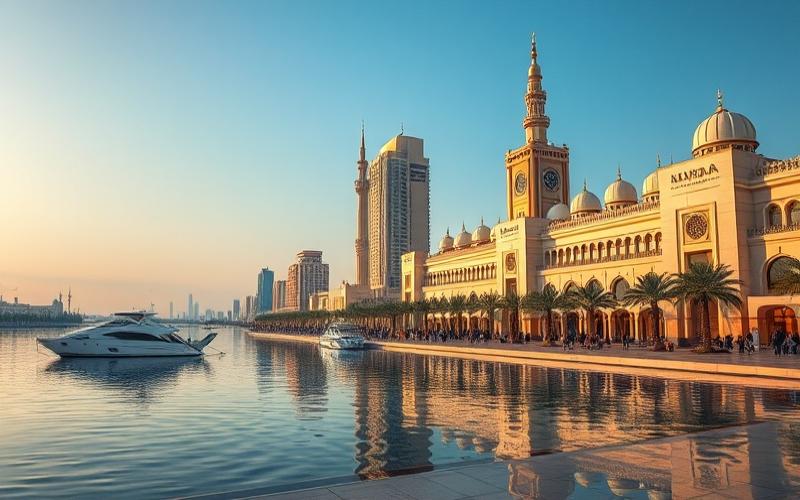
 Published on and written by Cyril Jarnias
Published on and written by Cyril Jarnias
Dubai, the jewel of the United Arab Emirates, is attracting an increasing number of entrepreneurs from around the world thanks to its dynamic business environment and tax benefits. Whether you’re an ambitious entrepreneur or a multinational company looking to establish a presence in the Middle East, setting up a company in Dubai can be a strategically wise decision. However, the business formation process in this cosmopolitan city requires a thorough understanding of administrative procedures and legal requirements. In this article, we will break down the crucial steps to establish your commercial presence in Dubai, highlighting the administrative nuances and essential documents required based on your chosen legal structure.
The Strategic Choice of Legal Structure
The first crucial step in creating your company in Dubai is choosing the legal structure that best fits your business objectives. This decision will not only influence your daily operations but also your legal and tax obligations.
The main options available to you are:
- Limited Liability Company (LLC)
- Free Zone Company
- Branch of a Foreign Company
- Representative Office
Each structure has its own advantages and constraints. For example, an LLC allows you to operate freely in the local market but requires an Emirati partner holding 51% of shares, while a free zone company offers 100% foreign ownership but limits activities in the domestic market.
The choice of structure will depend on several factors:
- The nature of your activity
- Your investment budget
- Your expansion goals
- The degree of control you wish to maintain over your company
It is crucial to carefully weigh the advantages and disadvantages of each option before making a decision. Consultation with a business setup expert in Dubai can prove invaluable in making the most judicious choice.
Good to Know:
The free zone structure is particularly popular among foreign entrepreneurs as it offers 100% ownership, tax exemptions, and simplified procedures. However, it limits activities in the local UAE market.
Key Steps to Launch Your Company in Dubai
Once the legal structure is chosen, you must follow a series of administrative steps to materialize your entrepreneurial project in Dubai. Here is an overview of the main procedures to undertake:
1. Trade Name Reservation
Choosing and reserving your company name is a fundamental step. In Dubai, the trade name must comply with certain strict rules:
- Must not contain offensive or blasphemous terms
- Must not reference government entities without authorization
- Must be unique and not violate existing trademark rights
Name reservation is done with the Dubai Department of Economic Development (DED) or the relevant free zone authority. It is recommended to prepare several name options in case your first choice is not available.
2. Obtaining Initial Approval
Once the name is approved, you must submit an application for initial approval. This step involves providing a detailed business plan and information about shareholders. The competent authority will review your application to ensure your activity complies with local regulations.
3. Preparation and Submission of Legal Documents
This crucial phase requires careful preparation of various legal documents, including:
- Company contract (for LLCs)
- Company bylaws
- Application forms specific to the chosen jurisdiction
The accuracy and completeness of these documents are essential to avoid any delays in the approval process.
4. Obtaining the Business License
Obtaining the business license marks the final step in creating your company. This license, issued by the DED or the free zone authority, officially authorizes you to conduct your activities in Dubai. The type of license (commercial, industrial, professional) will depend on the nature of your activity.
The time to obtain the license can range from a few days to several weeks, depending on the complexity of your file and the responsiveness of the authorities.
Good to Know:
The cost of setting up a business in Dubai varies considerably depending on the chosen structure and location. For an LLC, expect between 15,000 and 50,000 AED (approximately $4,100 to $13,600 USD), while for a free zone company, costs can range from 20,000 to 100,000 AED (approximately $5,400 to $27,200 USD).
Essential Documents: Your Passport to Success
Setting up a company in Dubai requires the preparation and submission of a specific set of documents. These documents vary according to the chosen legal structure, but some are common to all business forms.
Documents Required for All Structures
- Copies of passports for all shareholders and directors
- Detailed CVs of shareholders and directors
- Proof of residence (recent utility bills, etc.)
- Detailed business plan
- Duly completed application forms
Specific Documents for LLCs
For Limited Liability Companies (LLCs), additional documents are required:
- Company contract detailing share distribution and partner responsibilities
- Letter of consent from the local partner (Emirati sponsor)
- Certificate of minimum capital (generally 300,000 AED, approximately $81,700 USD)
Documents for Free Zone Companies
Free zone companies have slightly different documentary requirements:
- Application form specific to the chosen free zone
- Letter of intent detailing planned activities
- Proof of capital (amount varies by free zone)
- Office lease agreement or service agreement for shared workspace
Documents for Branches and Representative Offices
For these structures, additional documents are required:
- Board resolution from the parent company authorizing the establishment of the branch or office
- Certified copy of the parent company’s bylaws
- Letter of appointment for the branch manager
- Audited financial statements of the parent company for the last two years
It is crucial to note that all documents in foreign languages must be translated into Arabic by a UAE-certified translator and legalized by the UAE embassy in the country of origin, then by the Ministry of Foreign Affairs in Dubai.
Good to Know:
Preparing and legalizing documents can take several weeks. It is recommended to start this process as early as possible to avoid any delays in setting up your company.
Setting up a company in Dubai involves interacting with various government authorities. Understanding their roles and requirements is essential for smooth navigation through the administrative process.
The Department of Economic Development (DED)
The DED is the main authority for business registration on the Dubai mainland. Its responsibilities include:
- Approval of trade names
- Issuance of business licenses
- Supervision of commercial activities
The DED has implemented an online system to facilitate many procedures, thereby reducing wait times and simplifying the process for entrepreneurs.
Free Zone Authorities
Each free zone in Dubai has its own regulatory authority. For example:
- Dubai Multi Commodities Centre (DMCC) for commodity trading
- Dubai Internet City for technology companies
- Jebel Ali Free Zone (JAFZA) for industrial and logistics activities
These authorities manage the entire business setup process within their jurisdiction, from initial approval to license issuance.
General Directorate of Residency and Foreigners Affairs (GDRFA)
The GDRFA is responsible for issuing residence visas for investors and employees. Its role is crucial in the process of:
- Obtaining entry visas
- Processing residence visa applications
- Visa renewals
Ministry of Labor
For companies operating on the mainland, the Ministry of Labor plays an important role in:
- Approval of employment contracts
- Issuance of work permits
- Resolution of employer-employee disputes
It is important to note that free zone companies generally handle employment-related matters directly with their zone authority, without going through the Ministry of Labor.
Good to Know:
Setting up a company in Dubai may seem complex, but with proper preparation and the help of local experts, the process can be relatively quick. On average, it takes between 2 to 4 weeks for a free zone company and 4 to 8 weeks for a mainland LLC.
Challenges and Opportunities of Entrepreneurship in Dubai
Starting a business in Dubai offers many opportunities, but also involves specific challenges that are important to understand and anticipate.
Opportunities to Seize
Dubai offers fertile ground for ambitious entrepreneurs:
- A favorable tax environment with little or no corporate and personal income taxes
- A strategic geographical position between East and West, facilitating access to emerging markets
- World-class infrastructure, particularly in terms of transportation and telecommunications
- A diversified economy offering opportunities in many sectors
According to DED statistics, Dubai recorded a 5.9% growth in new business licenses in 2024, demonstrating the emirate’s continued appeal to entrepreneurs worldwide.
Challenges to Overcome
However, entrepreneurship in Dubai also has its challenges:
- The need to adapt to a different cultural and business environment
- The complexity of regulations that can vary by industry sector
- The high cost of living and business operations, particularly in terms of rents and skilled labor
- Intense competition in certain saturated sectors
It is crucial to prepare well and surround yourself with experienced advisors to navigate effectively in this dynamic but demanding environment.
Good to Know:
Dubai has launched several initiatives to support startups and SMEs, such as Dubai Future Accelerators and Dubai SME. These programs offer valuable support to entrepreneurs in terms of funding, mentoring, and market access.
Conclusion: Your Springboard to Success in Dubai
Setting up a company in Dubai represents an exceptional opportunity for visionary entrepreneurs. With its strategic position, state-of-the-art infrastructure, and attractive tax environment, Dubai offers fertile ground for business development on a regional and international scale.
However, success in this dynamic environment requires meticulous preparation and a thorough understanding of administrative and legal processes. From selecting the appropriate legal structure to navigating the intricacies of local bureaucracy, each step requires attention and expertise.
The keys to success for your entrepreneurial project in Dubai include:
- Rigorous strategic planning
- Clear understanding of local regulations
- Building a strong network of local partners and advisors
- Adaptability to the region’s cultural and commercial specificities
By following the steps detailed in this guide and staying informed about regulatory developments, you will lay solid foundations for your business in Dubai. Remember that setting up a company is only the beginning of the adventure. The real challenge lies in growing and sustaining your activity in an ever-evolving market.
Disclaimer: The information provided on this website is for informational purposes only and does not constitute financial, legal, or professional advice. We encourage you to consult qualified experts before making any investment, real estate, or expatriation decisions. Although we strive to maintain up-to-date and accurate information, we do not guarantee the completeness, accuracy, or timeliness of the proposed content. As investment and expatriation involve risks, we disclaim any liability for potential losses or damages arising from the use of this site. Your use of this site confirms your acceptance of these terms and your understanding of the associated risks.















